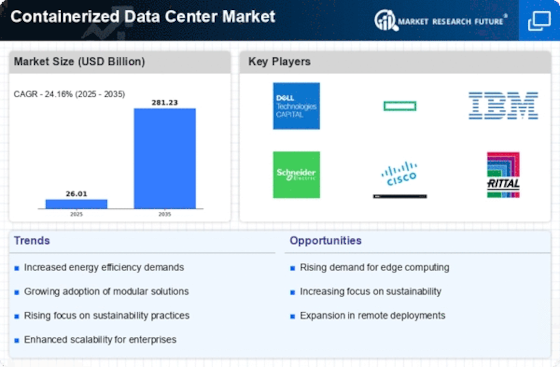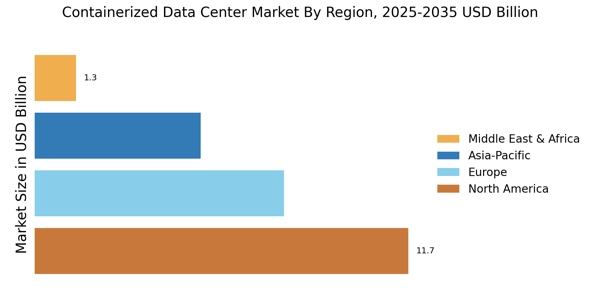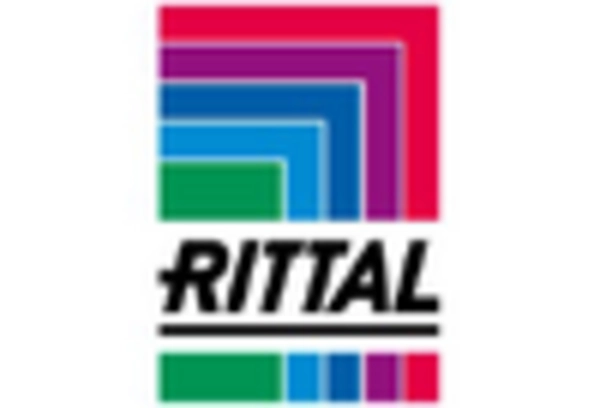Rapid Technological Advancements
Technological advancements are a crucial driver for the Containerized Data Center Market. Innovations in hardware, software, and networking technologies are enabling more efficient and powerful containerized solutions. The integration of artificial intelligence and machine learning into data center operations is enhancing performance and resource management. Additionally, advancements in virtualization technologies allow for better utilization of resources, further driving the appeal of containerized solutions. As organizations strive to keep pace with technological changes, the demand for adaptable and high-performance data centers is likely to increase. The Containerized Data Center Market is expected to grow as companies invest in cutting-edge technologies that enhance operational capabilities and improve service delivery.
Increased Demand for Edge Computing
The rise of edge computing is a pivotal driver for the Containerized Data Center Market. As organizations seek to process data closer to the source, the need for modular and portable data centers becomes apparent. This trend is underscored by the projected growth of edge computing, which is expected to reach a market size of approximately 15 billion USD by 2025. Containerized data centers offer the flexibility and scalability required to support edge applications, enabling businesses to deploy resources rapidly in various locations. This adaptability is crucial for industries such as telecommunications and IoT, where latency and real-time processing are paramount. Consequently, the Containerized Data Center Market is likely to experience substantial growth as companies invest in infrastructure that meets the demands of edge computing.
Sustainability and Energy Efficiency
Sustainability initiatives are increasingly influencing the Containerized Data Center Market. As environmental concerns gain prominence, organizations are prioritizing energy-efficient solutions that reduce their carbon footprint. Containerized data centers are designed with energy efficiency in mind, often utilizing advanced cooling technologies and renewable energy sources. This focus on sustainability is reflected in the growing number of companies committing to carbon neutrality by 2030. The Containerized Data Center Market is likely to benefit from this trend, as businesses seek to align their operations with environmental goals. Moreover, energy-efficient data centers can lead to significant cost savings, further incentivizing adoption. The market is expected to expand as more organizations recognize the dual benefits of sustainability and operational efficiency.
Cost Efficiency and Operational Flexibility
Cost efficiency remains a significant driver for the Containerized Data Center Market. Organizations are increasingly drawn to containerized solutions due to their lower capital expenditure compared to traditional data centers. The modular nature of these facilities allows for incremental investment, enabling businesses to scale operations in alignment with demand. Furthermore, operational flexibility is enhanced as containerized data centers can be deployed in diverse environments, from remote locations to urban centers. This adaptability not only reduces operational costs but also minimizes the time required for deployment. As companies continue to seek ways to optimize their IT expenditures, the Containerized Data Center Market is poised for growth, with an estimated increase in market size projected to reach 10 billion USD by 2026.
Growing Need for Disaster Recovery Solutions
The increasing frequency of natural disasters and cyber threats is driving the demand for robust disaster recovery solutions within the Containerized Data Center Market. Organizations are recognizing the importance of having resilient infrastructure that can withstand disruptions. Containerized data centers offer a viable solution, as they can be rapidly deployed in alternative locations to ensure business continuity. This capability is particularly appealing to sectors such as finance and healthcare, where data integrity and availability are critical. The market for disaster recovery solutions is projected to grow significantly, with containerized options becoming a preferred choice for many organizations. As businesses prioritize risk management and resilience, the Containerized Data Center Market is likely to see a surge in demand for these adaptable solutions.
.png)

















